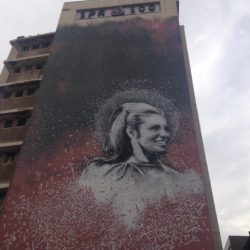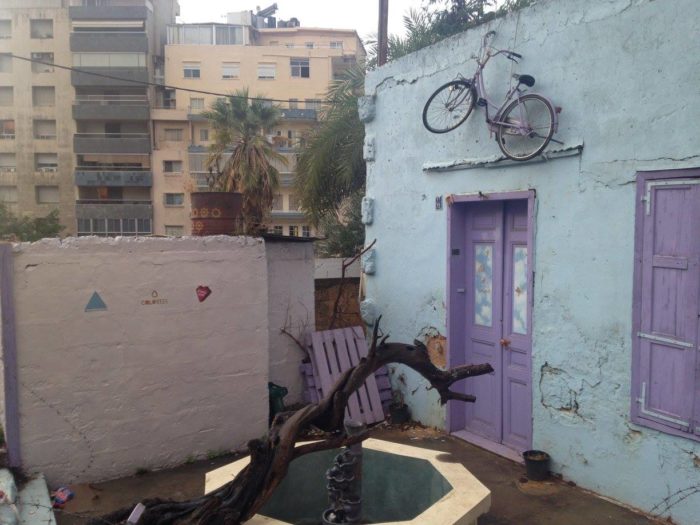Art, Language, Youth and the legacy of Conflict in Lebanon
Art, Language, Youth and the legacy of Conflict in Lebanon is a sister project of Changing the Story, based at the Centre for World Cinemas and Digital Cultures (CWCDC) at University of Leeds. It is the second phase of an AHRC Open World Research Initiative project led by Professor Paul Cooke entitled "Remapping World Cinemas for the Digital Age Finding Ways for the Digital Subaltern to Speak".
 The project explores the gap between how national elites seek to use film culture to project themselves internationally and how this is understood by communities that consider themselves to be excluded – not least linguistically – from such elite discourses. This is part of a wider group of projects that form the Open World Research Initiative Project "Cross-Language Dynamics: Reshaping Communities", led at the University of Manchester by Professor Stephen Hutchings. In particular "Remapping World Cinemas" supports the Transnational Strand of this project, co-led at Durham University by Professors Andy Byford (MLAC) and Anoush Ehteshami (SGIA).
The project explores the gap between how national elites seek to use film culture to project themselves internationally and how this is understood by communities that consider themselves to be excluded – not least linguistically – from such elite discourses. This is part of a wider group of projects that form the Open World Research Initiative Project "Cross-Language Dynamics: Reshaping Communities", led at the University of Manchester by Professor Stephen Hutchings. In particular "Remapping World Cinemas" supports the Transnational Strand of this project, co-led at Durham University by Professors Andy Byford (MLAC) and Anoush Ehteshami (SGIA).
Phase 1 of the project focussed on workshops with scholars, industry and international development professionals. It considered how changes in the production, distribution and consumption of audio-visual texts created opportunities for ‘subaltern’ voices to express their cultural and linguistic identity, acknowledging the influence of global north cultural conglomerates in shaping who can be heard. Phase 2 (Art, Language, Youth and the legacy of Conflict in Lebanon) builds on this learning through impact-focused ‘participatory-action research' (PAR), working with marginalized groups in Lebanon. Using a range of participatory arts methodologies- in particular the co-production of video responses to the project’s findings, we will explore how the role of language in Lebanon, and in particular the place of linguistic hybridity amongst young people and the role this plays in generating new societal narratives that are engaging with the nation's difficult past, with the aim of supporting increased social cohesion and stronger civil society.
In the process, we will explore the plurality of conflict landscapes in the country, and the ways in which young people might co-create new narratives through creative practices that can challenge dominant discourse of war and silence. The University of Leeds will work in close partnership with British Council (BC)’s Global Research Team British Council Lebanon, its in-country networks and Issam Fares Institute for Public Policy and International Affairs to deliver this project.
We will:
- Conduct a rigorous literature review on the role of languages and culture in the collective understanding of conflict, reconciliation and social change in Lebanon, analysing past practice of artistic and socially-engaged community-based cultural interventions.
- Conduct primary qualitative research to further understand the specific role language and culture can play with young people in addressing issues of marginalisation, inclusion and ownership of cultural spaces and representation in Lebanon.
- Deliver and evaluate a new pilot programme based on these findings, co-created with NGOs and young people, including refugees from the recent war in Syria and young people from the urban communities living alongside them in informal settlements.
- In so doing, we will add to the national debate in the UK around the role of art and culture as a vehicle for cross-community and transnational communication, looking particularly at the role of Arabic as a site of cultural conflict that can, at times, 'flatten out' cultural differences between communities and at times empower marginalised communities to challenge national narratives.
The project is currently in the planning stage with work underway of a 'critical review' of current arts practice in Lebanon. PAR activities are set to begin in September and will run for 12 months until 2019. Stay tuned for more information as the project progresses.
Check out the links below to find out more:
Project News Youth Roll Videos Project PartnersRead the latest report about the 'Youth Role' research project here.



